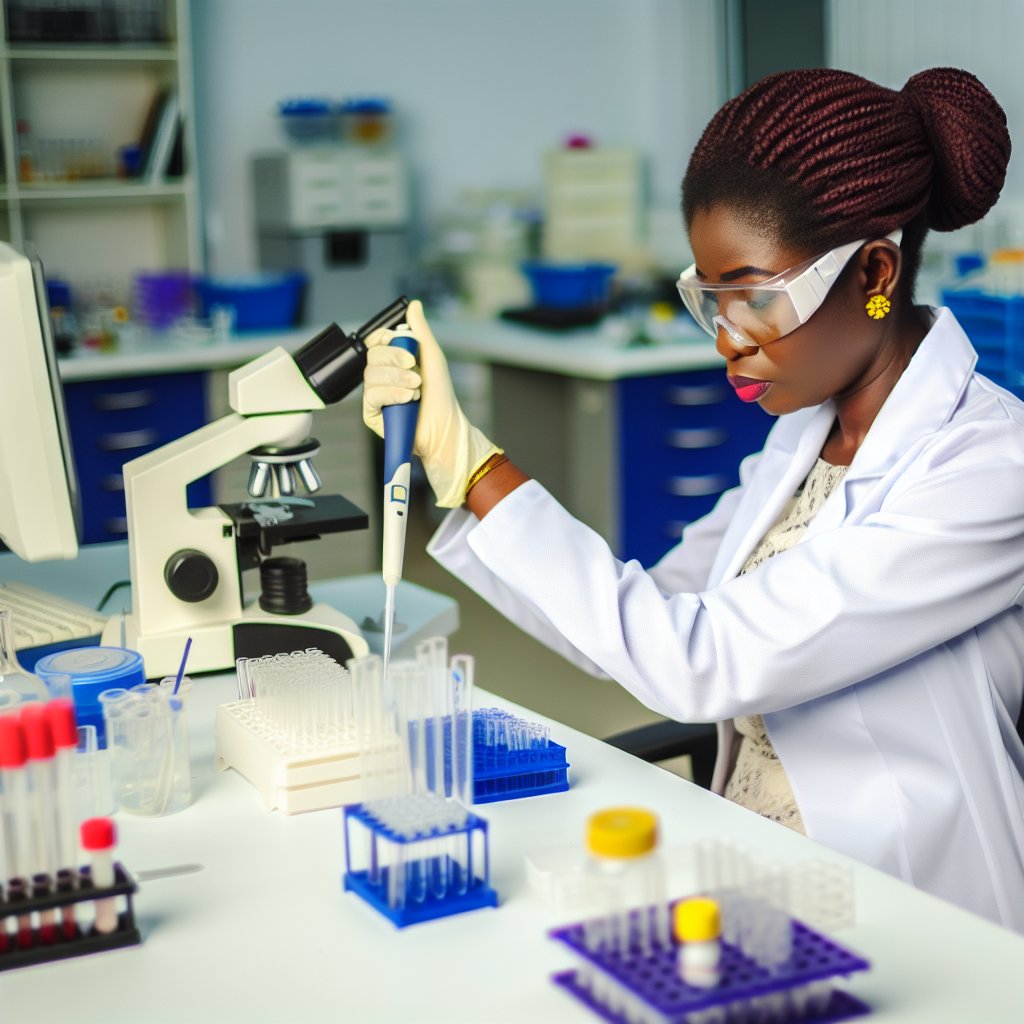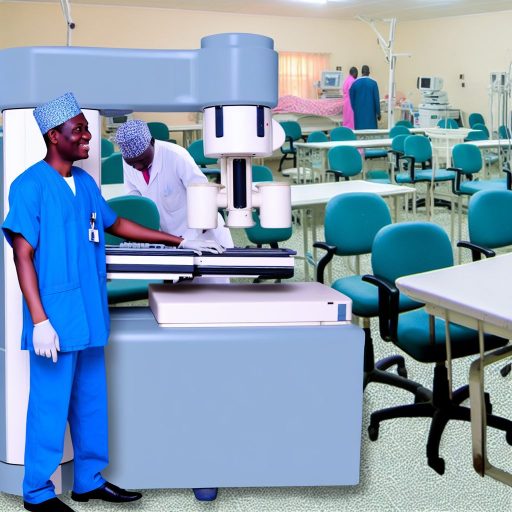Introduction:
Medical lab scientists play a vital role in healthcare by conducting tests to help in disease diagnosis.
Roles and Responsibilities:
Medical lab scientists perform various tests on samples such as blood, urine, and tissues to aid in diagnosis.
They ensure the accuracy of results by following standardized procedures and maintaining high-quality standards.
Medical lab scientists are responsible for calibrating and maintaining laboratory equipment to ensure proper functioning.
They maintain detailed records of test results and other lab activities for future reference and analysis.
Medical lab scientists work closely with other healthcare professionals to interpret test results and form treatment plans.
They may also be involved in research projects to develop new testing methods and improve existing techniques.
Medical lab scientists stay updated with the latest advancements in the field through continuous education and training.
They ensure that all laboratory procedures adhere to regulatory guidelines and safety protocols to maintain a safe working environment.
Medical lab scientists use critical thinking skills to troubleshoot issues and ensure accurate and reliable test results.
They communicate effectively with healthcare providers to convey test results and assist in proper patient care.
Education and training requirements:
Individuals interested in becoming a medical lab scientist typically need a bachelor’s degree in Medical Laboratory Science or a related field.
Some universities offer specific programs in Medical Laboratory Science, while others may require a degree in biology or chemistry.
Courses in biology, chemistry, math, and statistics are essential to build a strong foundation for a career in medical lab science.
Hands-on experience through internships or clinical rotations is crucial to gain practical skills in a laboratory setting.
Upon completing the education requirements, aspiring medical lab scientists must pass a certification exam administered by organizations such as the ASCP.
Importance of continuing education:
Continuing education is vital for medical lab scientists to stay updated on the latest advancements in laboratory technology and practices.
New diagnostic tests, equipment, and techniques are constantly being developed, requiring professionals to adapt and learn new skills.
Engaging in continuing education opportunities allows medical lab scientists to enhance their knowledge and expertise, ultimately benefiting patient care.
Attending conferences, workshops, and seminars enables professionals to network with peers and exchange ideas to improve practices in the lab.
Continuing education also helps medical lab scientists meet the licensure renewal requirements set by regulatory bodies and maintain their credentials.
Performing diagnostic tests:
Medical lab scientists are responsible for performing a variety of diagnostic tests.
These tests include blood tests, urine tests, microbiology tests, and molecular tests.
Accuracy and precision in test results are crucial for accurate diagnosis and treatment.
Errors in test results can lead to misdiagnosis and improper treatment of patients.
Medical lab scientists must follow strict protocols and procedures to ensure accurate test results.
They handle patient samples with care and ensure that the testing process is error-free.
Medical lab scientists use specialized equipment and technology to perform diagnostic tests.
They interpret test results and communicate findings to healthcare professionals for further evaluation.
Medical lab scientists play a vital role in the healthcare system by providing accurate and reliable diagnostic information.
They work collaboratively with other healthcare professionals to ensure accurate diagnosis and treatment of patients.
See Related Content: Salary Expectations for Radiographers in Nigeria
Analyzing Test Results in Medical Laboratories
Analyzing test results is a crucial aspect of the role of medical lab scientists.
This process involves interpreting data to provide accurate diagnoses for patients.
Here’s how medical lab scientists go about analyzing test results.
The importance of critical thinking and problem-solving skills in this process cannot be overstated.
Interpreting Test Results
Medical lab scientists analyze test results by comparing them to established reference ranges.
They look for any abnormalities or patterns that could indicate a medical condition.
This requires attention to detail and a thorough understanding of the significance of each test.
Identifying Potential Errors
In analyzing test results, medical lab scientists must also be vigilant for potential errors.
Transform Your Career with Expert Guidance
Get personalized mentorship consulting that’s tailored to your unique path. Our expert advice is actionable and exclusive.
Get StartedThis could include sample contamination, instrument malfunction, or human error.
Critical thinking skills are essential in identifying and rectifying these errors.
Consulting with Healthcare Providers
Once test results have been analyzed, medical lab scientists often collaborate with healthcare providers.
They determine the best course of action for the patient.
They may provide additional insight or suggest further testing based on their analysis.
Clear communication and the ability to think critically about the implications of the results are key in these interactions.
Problem-Solving Skills
Medical lab scientists must use problem-solving skills to troubleshoot discrepancies in test results.
They need to think critically about the possible causes of unexpected findings.
This may involve repeating tests, consulting with colleagues, or exploring alternative explanations.
Ensuring Quality Control
As part of analyzing test results, medical lab scientists ensure the quality of the data produced.
This includes monitoring the performance of testing equipment and maintaining proper documentation.
Following established protocols for data analysis is essential.
Attention to detail and a commitment to accuracy help maintain high standards of quality control.
See Related Content: Role of Technology in Physiology Education
Maintaining lab equipment:
The role of medical lab scientists in maintaining and calibrating laboratory equipment is crucial for accurate test results.
Regular maintenance of lab equipment ensures accuracy in test results.
Calibrating equipment helps in keeping the instruments precise and reliable.
Lab scientists are responsible for conducting routine checks on equipment.
They must follow manufacturer guidelines for maintenance and calibration.
It is essential for medical lab scientists to prioritize safety protocols when working with lab equipment.
Following safety protocols prevents accidents and injuries in the lab.
Proper calibration reduces the risk of errors in test results.
Regular maintenance ensures the longevity of laboratory equipment.
Adhering to safety guidelines creates a safe working environment for all staff.
Delve into the Subject: Understanding the Role of Radiographers in Nigerian Healthcare
Quality control and assurance are crucial aspects of the daily work of medical lab scientists.
Importance of quality control measures in the lab:
- Quality control measures ensure accurate test results for patient diagnosis and treatment.
- They help in detecting any errors or variations in testing procedures and equipment.
- By implementing quality control measures, labs can maintain consistency and reliability in their results.
- Patient safety depends on the accuracy of lab results which is ensured through quality control measures.
How medical lab scientists monitor and maintain quality assurance standards:
- Scientists regularly calibrate lab equipment to ensure accuracy and reliability of test results.
- They perform daily quality control checks to verify the accuracy of testing procedures.
- Regular participation in proficiency testing programs helps in evaluating the lab’s performance against other labs.
- External quality assessment schemes are utilized to validate the accuracy of test results with external standards.
- Scientists document all quality control procedures and results to ensure traceability and accountability.
Quality control and assurance are indispensable practices in the field of medical laboratory science to uphold high standards of accuracy and reliability in testing procedures.
Discover More: Difference Between Nursing and Nursing Science

Medical Laboratory Scientists and Healthcare Collaboration
Medical laboratory scientists play an essential role in collaborating with other healthcare professionals to develop effective treatment plans for patients.
This collaboration is crucial in providing comprehensive and quality patient care.
Importance of Collaboration with Healthcare Professionals:
- Enhances patient outcomes
- Promotes interdisciplinary teamwork
- Improves accuracy of diagnosis
- Facilitates timely treatment
Effective Communication:
Medical lab scientists must effectively communicate with physicians, nurses, and other professionals to ensure accurate test results and prompt treatment.
Clear communication helps in avoiding errors and achieving optimal patient care outcomes.
Teamwork in Providing Quality Patient Care:
Collaborating with healthcare professionals as a team is critical in addressing complex medical conditions and delivering holistic care to patients.
Each member brings unique expertise to the table, contributing to a comprehensive and well-rounded approach to patient treatment.
How Medical Lab Scientists Work Closely with Other Healthcare Professionals:
- Consultation on test selection
- Interpretation of test results
- Discussing treatment options
- Sharing expertise on specific diseases
Medical lab scientists often consult with physicians and specialists to select appropriate laboratory tests based on the patient’s symptoms and medical history.
They play a key role in interpreting test results accurately and providing valuable insights to healthcare teams.
Collaborating with healthcare professionals involves discussing treatment options and sharing expertise on specific diseases.
This interdisciplinary approach ensures that patients receive individualized care tailored to their unique needs and circumstances.
Furthermore, medical lab scientists work closely with nurses to ensure seamless coordination of patient care.
They provide essential information to nurses for implementing treatment plans and monitoring patient progress.
Additionally, collaborating with pharmacists allows medical lab scientists to optimize medication therapy and ensure patient safety.
By sharing insights on drug interactions and dosages, they contribute to the effective management of patient conditions.
Research and development:
Medical lab scientists play a crucial role in research and development within the healthcare industry.
They are responsible for examining and improving diagnostic tests and treatment procedures.
Medical lab scientists work tirelessly to enhance the quality and accuracy of healthcare services.
They are involved in conducting experiments, gathering data, and analyzing results to identify potential advancements.
By collaborating with other healthcare professionals, medical lab scientists contribute to the development of innovative technologies.
Opportunities for medical lab scientists:
Medical lab scientists have various opportunities to make significant contributions to advancements in healthcare.
They can participate in clinical trials to test new medications or treatment methods.
Medical lab scientists can also engage in community-based research projects to address public health concerns.
They may be involved in studying rare diseases or conditions to improve early detection and treatment outcomes.
Medical lab scientists can collaborate with pharmaceutical companies to develop new drugs and therapies.
Research and development are vital aspects of the role and responsibilities of medical lab scientists.
Their contributions to enhancing diagnostic tests, treatment procedures, and healthcare technologies are essential for improving patient care and outcomes.
Importance of Medical Lab Scientists
Medical lab scientists play crucial roles in healthcare.
They conduct tests, analyze results, and ensure accuracy.
Lab safety is paramount to protect patients and staff.
Communication for patient care and research is vital.
Their work contributes significantly to diagnosis and treatment.
Medical lab scientists are indispensable healthcare professionals.
Additional Resources
What is Medical Laboratory Science? | Biological Sciences …
Enhancing quality healthcare in Nigeria through medical laboratory …




